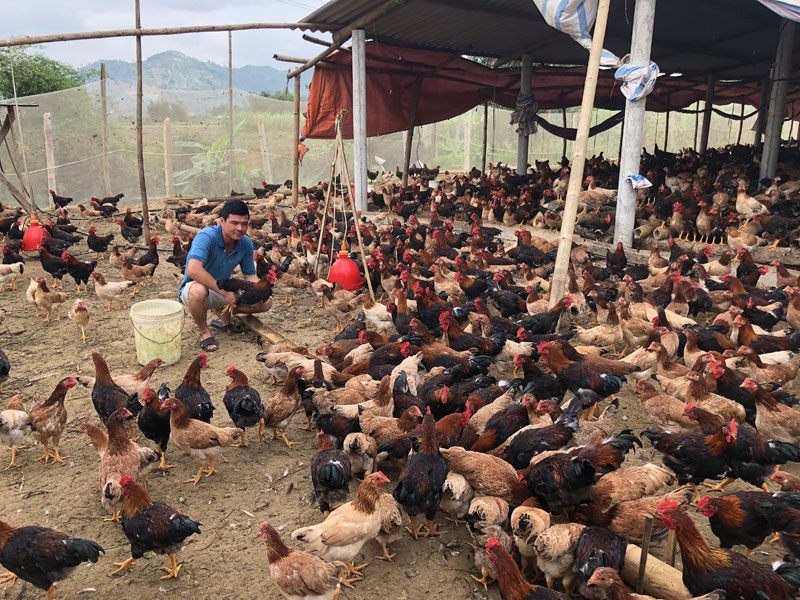
(HBO) - In 2015, some farmers in Dam hamlet, Yen Nghiep commune (Lac Son) discussed, exchanged and selected the investment in the indigenous chicken raising in the direction of trade with the purpose of economic development of the family.
In 2016, stemming from the need to regroup, they formed a hobby group, officially establishing a cooperative group to raise the indigenous chicken in Dam hamlet with 8 households. By the synergy of the members, the cooperative group has maintained and developed, becoming a reliable address for indigenous chicken supply to the market inside and outside the province.
 The chicken farm of the cooperative group in Dam hamlet, Yen Nghiep commune (Lac Son) has been combining farming with high quality products.
The chicken farm of the cooperative group in Dam hamlet, Yen Nghiep commune (Lac Son) has been combining farming with high quality products.
The person who has been devoting much to the development of the cooperative group in Dam hamlet is Mr. Bui Van Linh. He has been acting a leader. More than 30 years old, Mr. Linh has had decades attaching to farming from rice cultivation, sugarcane planting, corn cultivation, pig raising and now building the chicken farms.
At the same time in 2016, some other typical households in Dam hamlet also started to raise chicken, namely Mr. Duong Van Diem, Bui Van Em and Bui Van Vi.
The team leader is the manager, assigning daily tasks to the other members. At the same time, the members of the team promote the spirit of learning, exchanging and sharing experiences so that the production and business activities are convenient and smooth.
Combining forces to develop together, the households in the cooperative group in Dam hamlet not only help each other in terms of techniques but also in the stage of breeding, capital, experience and linking consumer markets.
With the business season focused mainly in April and September and during the lunar New Year, the members of the group have been developing the chicken production based on the set plan. The consumption through the wholesale customers and the buyers themselves account for about 90%, the remaining 10% is sold to the retail customers or the weddings. There have been 15 chicken farms in the whole cooperative group. Each farm maintains an average of 1,500-2,000 chicken a litter, each year 4.6 - 4.7 thousand of chicken are raised.
In order to stabilize on the way of starting a business, the members of the group want to be supported the necessary and sufficient conditions in the future to become the cooperative, applying the procedures and the standards for commercial clean chicken, ensuring food safety, having logos and identification labels to affirm the brand, improving the competitiveness and meeting the consumers’ confidence. On the other hand, the cooperative group has the access to join the chains of production and consumption to create the sustainable livestock value.
Dao Village’s honey – a product certified with a 3-star OCOP (One Commune One Product) rating by Thong Nhat Agricultural Cooperative in Dao Village (Hoa Binh City) – is highly regarded by consumers for its quality, richness, and variety in packaging. The distinctively sweet taste of Dao Village’s honey leaves a lasting impression on anyone who has tried it.
In alignment with Project No. 07-DA/TU, issued by the Hoa Binh provincial Party Committee on November 1, 2021, Lac Thuy district has actively promoted investment and supported the sustainable development of its industrial and handicraft sectors during the 2021–2025 period. Alongside this, the district has remained committed to preserving and revitalising traditional craft villages.
Located in the northern part of Lac Thuy district, with a temperate climate and fertile soil, Phu Thanh commune has great potential and advantages in growing tea. The long-standing experience, combined with strict adherence to organic farming practices in the tea gardens, ensures that the dried tea products from Phu Thanh and Lac Thuy as a whole are sold out immediately upon production, providing a stable and prosperous life for the local people.
Amid efforts to streamline the administrative apparatus, Hoa Binh province has intensified measures to address challenges in land clearance, resettlement support, and infrastructure investment, aiming to speed up the progress of key projects.
Hoa Binh province has posted an unprecedented economic growth rate of 12.76% in the first quarter of 2025, marking its highest quarterly performance to date and positioning it as the second fastest-growing locality in the country, trailing only Bac Giang province.
Under current regulations, products in the One Commune – One Product (OCOP) programme that are rated three stars or higher must undergo re-evaluation every three months. However, in reality, some of these products fail to consistently meet the required standards, raising concerns about the sustainability of their OCOP certification. This underscores the urgent need for producers to enhance product quality and gradually develop their OCOP products into strong, marketable brands.



 The chicken farm of the cooperative group in Dam hamlet, Yen Nghiep commune (Lac Son) has been combining farming with high quality products.
The chicken farm of the cooperative group in Dam hamlet, Yen Nghiep commune (Lac Son) has been combining farming with high quality products.